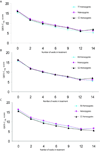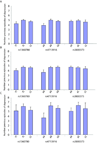The FKBP5-gene in depression and treatment response--an association study in the Sequenced Treatment Alternatives to Relieve Depression (STAR*D) Cohort
- PMID: 18191112
- PMCID: PMC2587308
- DOI: 10.1016/j.biopsych.2007.10.026
The FKBP5-gene in depression and treatment response--an association study in the Sequenced Treatment Alternatives to Relieve Depression (STAR*D) Cohort
Abstract
Background: In a recent study of several antidepressant drugs in hospitalized, non-Hispanic White patients, Binder et al. reported association of markers located within the FKBP5 gene with treatment response after 2 and 5 weeks. Individuals homozygous for the TT-genotype at one of the markers (rs1360780) reported more depressive episodes and responded better to antidepressant treatment. There was no association between markers in FKBP5 and disease. The present study aimed at studying the associated FKBP5 markers in the ethnically diverse Sequenced Treatment Alternatives to Relieve Depression (STAR*D) sample of non-hospitalized patients treated with citalopram.
Methods: We used clinical data and DNA samples from 1809 outpatients with non-psychotic major depressive disorder (DSM-IV criteria), who received up to 14 weeks of citalopram. A subset of 1523 patients of White non-Hispanic or Black race was matched with 739 control subjects for a case-control analysis. The markers rs1360780 and rs4713916 were genotyped on the Illumina platform. TaqMan-assay was used for marker rs3800373.
Results: In the case-control analysis, marker rs1360780 was significantly associated with disease status in the White non-Hispanic sample after correction for multiple testing. A significant association was also found between rs4713916 and remission. Markers rs1360780 and rs4713916 were in strong linkage disequilibrium in the White non-Hispanic but not in the Black population. There was no significant difference in the number of previous episodes of depression between genotypes at any of the three markers.
Conclusions: These results indicate that FKBP5 is an important target for further studies of depression and treatment response.
Figures


References
-
- Kessler RC, Berglund P, Demler O, Jin R, Koretz D, Merikangas KR, et al. The epidemiology of major depressive disorder: results from the National Comorbidity Survey Replication (NCS-R) JAMA. 2003;289:3095–3105. - PubMed
-
- Lopez AD, Murray CC. The global burden of disease, 1990–2020. Nat.Med. 1998;4:1241–1243. - PubMed
-
- Ustun TB, yuso-Mateos JL, Chatterji S, Mathers C, Murray CJ. Global burden of depressive disorders in the year 2000. Br.J.Psychiatry. 2004;184:386–392. - PubMed
-
- Thase ME, Haight BR, Richard N, Rockett CB, Mitton M, Modell JG, et al. Remission rates following antidepressant therapy with bupropion or selective serotonin reuptake inhibitors: a meta-analysis of original data from 7 randomized controlled trials. J.Clin.Psychiatry. 2005;66:974–981. - PubMed
Publication types
MeSH terms
Substances
Grants and funding
- Z01 HG000200/ImNIH/Intramural NIH HHS/United States
- R01 MH067257/MH/NIMH NIH HHS/United States
- R01 MH059587/MH/NIMH NIH HHS/United States
- R01 MH059586/MH/NIMH NIH HHS/United States
- Z01 MH002856/ImNIH/Intramural NIH HHS/United States
- R01 MH059566/MH/NIMH NIH HHS/United States
- R01 MH059588/MH/NIMH NIH HHS/United States
- N01 MH090003/MH/NIMH NIH HHS/United States
- R01 MH060879/MH/NIMH NIH HHS/United States
- R01 MH061675/MH/NIMH NIH HHS/United States
- Z01 AA000326/ImNIH/Intramural NIH HHS/United States
- R01 MH060870/MH/NIMH NIH HHS/United States
- Z01 MH002844/ImNIH/Intramural NIH HHS/United States
- R01 MH059571/MH/NIMH NIH HHS/United States
- R01 MH059565/MH/NIMH NIH HHS/United States
LinkOut - more resources
Full Text Sources
Medical
Miscellaneous

